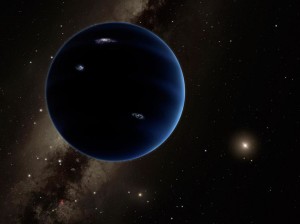A mysterious planet that wiped out life on Earth millions of years ago could do it again, according to a top space scientist. Some scientists believe that the apocalyptic event could happen as early as this month.

Planet Nine, a new planet reportedly discovered at the edge of the solar system in January, is said to have the potential to trigger comet showers that can bomb the Earth’s surface, killing all life, says Daniel Whitmire, of the University of Louisiana.
Planet Nine is a hypothetical large planet in the far outer Solar System, whose presence, scientists believe, would explain the unusual orbital configuration of a group of trans-Neptunian objects (TNOs) that orbit mostly beyond the Kuiper belt.
The astrophysicist says the planet has a 20,000-year orbit around the sun and, at its closest to us, it knocks asteroids and comets toward Earth.
Fossil evidence has suggested most life on Earth is mysteriously wiped out every 26 million to 27 million years.
Whitmire claims that Planet Nine’s passage through a rock-laden area called the Kuiper Belt is responsible for the “extinction events.”
Conspiracy theorists in the ’80s and ’90s previously claimed a red dwarf planet called Nibiru or Nemesis, which orbits too close to Earth every 36,000 years, was behind the events.
Now some are convinced there will be a collision or a near miss before the end of April.
Nemesis or Nibiru was widely dismissed as crackpot pseudo-science — until Planet Nine was identified in January by the California Institute of Technology.
News reports suggesting that humanity is about to be wiped out by a mysterious planet are almost certainly incorrect, according to certain quarters, who insist that there is no clear reason to think that destruction is coming. They stress that the planet hasn’t even been confirmed as real, yet, let alone suggestions that it could cause doomsday.
To this group, Planet Nine is an as yet unconfirmed planet that could sit on the edge of our solar system, and astronomers are currently hunting for it. It is thought to be 10 times the size of Earth and sits 600 times as far away from the sun — but has as yet only been hypothesised based on the unusual motion of other objects at the far end of our solar system, writes Andrew Griffin in Independent of London.
“But that has not kept some people from proclaiming that it is real and is about to destroy all life on Earth,” he adds.
Mike Brown, one of the two main people involved in the claims about Planet Nine, tweeted to confirm that there is no reason to think that Earth is about to be destroyed.
“Hey, so, fun fact? Planet Nine is not going to cause the earth’s destruction,” he wrote on Twitter. “If you read that it will, you have discovered idiotic writing!”
“The idea appears to have come about because of a combination of ideas about Nibiru or Planet X, a planet that some believe has not yet been found or has been wilfully covered up and will crash into Earth and destroy it. That belief has been widely discredited,” Griffin insists, adding:
“It seems to have combined with an idea suggested by scientists last week that Planet Nine’s strange orbit was involved in the periodic mass extinction events that some believe can be seen on Earth. The planet might trigger comet showers that hit the Earth and wipe out life, proposed a new paper by retired astrophysics professor Daniel Whitmire – but there is no reason to believe that such an event is going to happen this month, or any time soon.”
